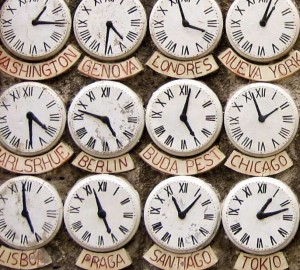Advertiser Disclosure: Eye of the Flyer, a division of Chatterbox Entertainment, Inc., is part of an affiliate sales network and and may earn compensation when a customer clicks on a link, when an application is approved, or when an account is opened. This relationship may impact how and where links appear on this site. This site does not include all financial companies or all available financial offers. Opinions, reviews, analyses & recommendations are the author’s alone, and have not been reviewed, endorsed, or approved by any of these entities. Some links on this page are affiliate or referral links. We may receive a commission or referral bonus for purchases or successful applications made during shopping sessions or signups initiated from clicking those links.
Welcome to a weekly feature on the Renés Points blog. Each week this series covers in a “rookie” way either a Delta or travel related theme and attempts to break down to a basic level each topic. You can read up on all the previous posts HERE. Now on to this week’s feature.
To me, one of the worst things about all our travel and spinning around the globe is the resulting jet lag. It is really hard to enjoy wherever you are if you are not awake to see it and experience the place. My friend and fellow BA blogger Kevin “hates” jet lag. My dearest bride, while well meaning, may not have the best suggestion about how to fight it as we will touch on later on.
Domestically this is not that big a deal to me. An hour between Eastern and Central is nothing. When skiing in Utah each year 2 hours is no big deal. Even East coast to West coast, that is a 3 hour change, is not “that” bad and can be made up in a day or two as your day / night sleep patterns just need to be tweaked a little. But when you are talking 6+ hours it can be a real pain. 12+ hours and you are really upside down.
My normal trips tend to be to Europe so I will focus on those for this post, but I would be thrilled to have comments on Asia and Australia etc. that are much more dramatic time shifts and what you do to make those transitions simpler. Also, I am focusing on going from west to east, that is, from the US to Europe. After all coming back I think most will agree it is not that bad, that is, all that happens is you wake up early for a few days and then you are over the change.
So this tends to be my normal issue. The day I arrive in Europe tends to be between 10 AM and 6 PM. The earlier flight is problematic. You want to nap. But napping more than 5-10 minutes means I am in trouble as I enter too deep a sleep and I am not able to go to sleep at a good time at night. But what about the later flights?
This is much better to me. The later flights result in arrival, sometimes dinner, a shower and off to bed at 8-9PM. But I have an consistent issue – I tend to wake up at 12-2AM and am really wide awake.
I have tried many things over the years such as “forcing” myself to stay in bed and get back to sleep. I have done the read in bed for a bit and try to get sleepy and that sometimes works. But here is what works best for me I have found. Get up.
Now I am not saying get up and stay up. I have found by getting up for less than 2 hours and going back to bed I can “shut my brain off” that I cannot do when just staying in bed. After 1-2 hours I am again sleepy as it is close to bed time at home and I can again sleep for a number of hours before “morning” where I am.
I can do this night after night if I need to and it still yields a decent amount of sleep hours each night until I fully adjust to where I am.
I also do try to “sleep in” but not too long. Sleeping till NOON where you are is just not a good idea. Set an alarm for 7-9AM to get your body to adjust to local morning time and to help you when it comes to hitting your normal sleep time at night.
Once you start hitting your stride, and even before, I just cannot stress enough that you really should avoid LONG naps during the day. Short cat naps of just 5-10 minutes (set an alarm please) are enough to knock off that irresistible urge to drop off into la-la land. Anything longer and you are in trouble later that night.
Food and drink. This is a hard one. We all know we SHOULD hydrate before we fly as flying sucks the water right out of you. Sure we should not drink adult beverages onboard but I do and am willing to pay for it later. But when I land I go back to water. Sure, that can be an issue overnight but unless I am getting up in the 12-2 range I am able to go back to bed after a visit to the bathroom. But as to food I try NOT to eat unless I am eating during the local times breakfast, lunch and dinner hours. I have found my stomach is one of the hardest things to reset to local time and eating at odd times a.k.a. home meal times does keep me from adjusting to local time as I should.
Sleeping “aids”. Should you ever medicate to sleep? I just don’t. I am no doctor nor would I ever give out medical advice. To me, with the above suggestions, medication should not be needed. But to each his / her own if you have found something that really works for you.
Lastly let’s touch on sleeping on jets. This is a big part of the whole equation. I can always sleep on jets. I can sleep sitting up (with recline) or clearly in a full flat seat bed. For those who cannot sleep on jets – ouch. You are going to be very sleepy day one and will need many 5-10 minute naps and may need to call it a day at the 6-7PM range day one.
So there are my rookie ideas for fighting jet lag. I think they are very good ones and I have had a chance to really test these as I have done this for many years and it works. But what do you think? What works best for you? I would love to know. – René.
Gold Delta SkyMiles®
Credit Card from American Express®
Click HERE for more info
Advertiser Disclosure: Eye of the Flyer, a division of Chatterbox Entertainment, Inc., is part of an affiliate sales network and and may earn compensation when a customer clicks on a link, when an application is approved, or when an account is opened. This relationship may impact how and where links appear on this site. This site does not include all financial companies or all available financial offers. Opinions, reviews, analyses & recommendations are the author’s alone, and have not been reviewed, endorsed, or approved by any of these entities. Some links on this page are affiliate or referral links. We may receive a commission or referral bonus for purchases or successful applications made during shopping sessions or signups initiated from clicking those links.













Rene,
I am of the ‘push through’ group. After arrival in Europe w/o significant sleep on the plane, we always push through the first day because we do not want to sleep through our visit. Then we sleep in on day 2. I once heard it takes a day a time zone to fully recover. Recently I heard the following two tidbits. Most of us are on a 1.5 hour sleep cycle so we sleep well in 1.5, 3, 4.5, 6, 7.5 hr increments. That varies by individual and each of us can determine our optimum cycle. Also, although it seems counterintuitive, a caffeine drink just before a ‘powernap’ allows you to get that short nap and then the caffeine kicks in when you wake up. Works for me.
I try to adjust quickly to the local time. If I land at 10 AM, I stay up until the same bed time I would at home (maybe an hour before if I’m really exhausted). If I land at 8 PM, I still try not to go to bed when I get to the hotel and try to stay up until the same bedtime as at home.
If I’ve been travelling for 30 hours, I might do a 1 hour nap if I get to my destination in the morning and haven’t slept on the plane. But otherwise, I stay up the longest I can and try to avoid naps! Usually the next morning I’m okay to go. And then it hits me the day after!
I wish I could sleep in airplanes… I will try some sleeping aid on my upcoming IAD-NRT and NRT-ORD (this one will be in Y on UA 747, ouch).
Jet lag really bothered me for years. I used to prep by going to bed earlier and getting up earlier for about 7-10 days before I left. So when I left home, my body clock was on my destination time and this worked well.
Then I had a project to shoot in Colorado and was there for about a week, firmly setting my body clock on Mountain Time. I flew to Atlanta and the next day I flew to Milan, so I’m in reality changing 8 time zones and no chance of my plan to adjust my body clock. The day I arrived, I had to shoot a project that afternoon and another one the next day. So I was forced to be on my A game, and what I discovered was, it works! I will admit to being a bit draggy at lunch, but that is time for me to decompress and come off of the rush of directing, thinking, looking and shooting. After eating, we get back into the van and I’m good to go.
Most of my major jet lag flights are where I’m crossing 6-9 time zones. The majority are from Atlanta to Milan to shoot fashion & beauty projects. Some are from Milan to LA. Delta gets me into Malpensa airport in the 8:00 – 9:00 AM range and by the time I get to my B&B it is about 10:30-11:00.
I now purposely start to work the moment I get there, usually going to several model agencies to cast models for a project starting the next morning. I force myself to stay awake until 11:00 pm where I find I’ll sleep until about 7:00 in time for breakfast. I’ll have the styling crew and the model arrive about 8:00 and while the make-up & hair styling start the process, I help my assistant loading the rental van with camera gear and wardrobe to then shoot either in the Milan or Como area. By the time we get back after dark, I am more than ready for bed. The next day we start all over.
Like a lot of things, it sounds a lot more glamorous than it really is… but I do love it!
Steve Thornton
Director-Photographer-Imagemaker
USA +1 404-231-9900
Milano +39 02.87.36.52.02
http://www.stevethornton.com/
Take that cpap machine with you and sleep on the plane! It really will not scare the other passengers and the flight crews have seem them many times.
Great tips Rene. I’ve often reset my biological clock in advance to U.K. time prior to traveling there. I’m on Central time, so if I can, I’ll work my way up to a 3:00 a.m. wake up (uggh), which gets me to 8 or 9 a.m. London time (depending on time of year). That has worked very well for me. Wish I could sleep well on planes like you. Even on lie-flats (I sure hope GUC’s don’t go away – haha – what am I thinking?! Another opportunity for Delta to #keepdescending…), I just manage to doze a bit.
I’m also talking about trips to Europe since that’s most of our overseas travel although we’ve put in hours to Asia as well. My husband and I have two different methods. He uses meds. He’ll wait until we’ve taken off and are at least an hour into the flight to take a sleeping pill. We’ve been on flights that have turned around after he’s taken a pill and it’s not been good. Then he sleeps for a good 8 hours and is well rested when we land. I’ll stay awake, watch a movie, read and try to nap and usually get in a good 4 hours. Then when we land I’ll push through putting in a full day with minimal tiredness. At night for at least the first 3 nights we use melatonin to reset our biological clocks and we are able to sleep through the night. This system has worked great for us.
When my wife & I flew to Beijing, we had a 5:00 PM departure from SEA, leaving Thursday and arriving Friday night around 8:00 PM (International Date Line and all). We stayed up the 11-ish hours, watched movies, enjoyed cocktails, coffee and LOTS of water. We’re so glad we stayed up — it just seemed like a long day (which it was). Once we got to our hotel and ate dinner, it was time for bed. We were well rested for our Beijing tour the next day.
Coming back was not quite as easy. We left Beijing on Sunday (quick trip, it was our first stab at a mileage run) at 11:00 AM and a few hours into the flight, it was dark — Saturday night. That threw me off a bit. I tried sleeping a little as I knew we’d wake up on Sunday morning (again). Some coffee and a second Sunday breakfast later, all was good. Early-ish to bed that night and we were back to normal a day later.
Going to SE Asia is no b og deal ,in 2 days I am ok .
Coming back to the US is another story .For 6 WEEKS I am off in Zombie land .I tried all tricks of the trade to no avail. Would pay good money for a solution.
i take the 9am EWR-LHR arrives 9 pm and stay over at an airport hotel then a morning flight to my final destination in EU. Similar departures from IAD and BOS on UA, perhaps others
Flights to Asia get timed to arrive afternoon or evening, then a nap on the plane and an early bedtime gets me mostly ready the next day.
for 6 or more hours i try a nap on the overnite plane then attempt to stay up all day by walking around etc if too tired i take a shower and get drssed and refreshed to walk around then at 10 pm hot shower and to bed to get up at 7 or 8